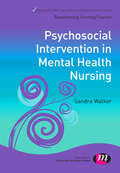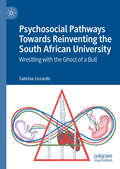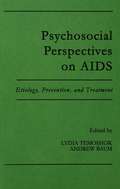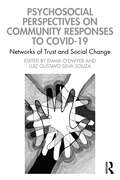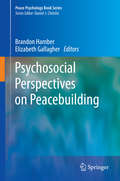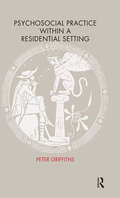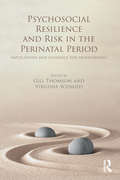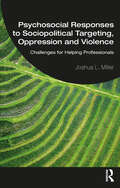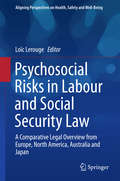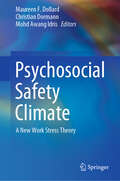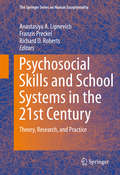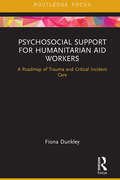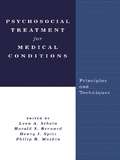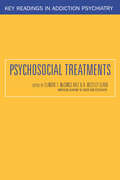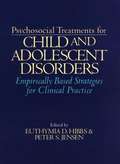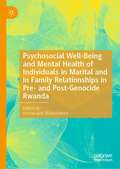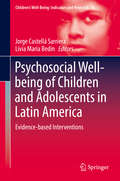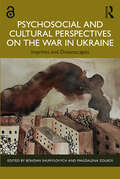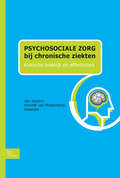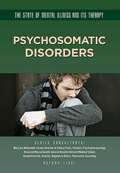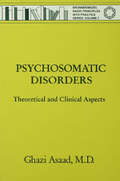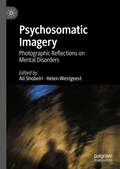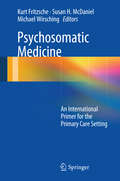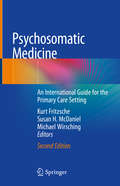- Table View
- List View
Psychosocial Interventions in Mental Health Nursing (Transforming Nursing Practice Series)
by Sandra WalkerIn order to give high quality care it is essential that mental health nurses have a solid grasp of the most common therapies and interventions used in mental healthcare. If nurses understand what the various interventions involve then they will be much better equipped to support patients through their recovery. This is a practical, engaging introduction to the major psychosocial interventions that demonstrates to students what the interventions are, why they are important and how they can be used. Key features - Interactive approach through realistic case studies that show how interventions can work to promote recovery - A patient centred approach considers the social as well as psychological aspects of mental healthcare - Each chapter is mapped to the relevant NMC standards and Essential Skills Clusters so that readers can see how they are meeting their professional requirements - Activities throughout challenge the reader to think critically and develop graduate skills
Psychosocial Pathways Towards Reinventing the South African University: Wrestling with the Ghost of a Bull
by Sabrina LiccardoThis book proposes a conceptual-empirical framework for exploring forms of continuity and change along psychosocial pathways in South African universities. It illustrates how the psychosocial pathways are grounded in the symbolic narratives and knowledges of young scientists, engineers and architects - all interlocutors in the research from which this book is based. Alala, Mamoratwa, Welile, Odirile, Kaiya, Amirah, Takalani, Nosakhele, Naila, Ambani, Khanyisile, Itumeleng, Ethwasa and Kgnaya provide collective standpoints in the multiplicities within and between the lived lives and told stories of young Black South African women in Science, Technology, Engineering, and Mathematics (STEM) fields. In doing so, this compelling work advances possibilities for demythologising scientific endeavour as a white male achievement and shifting knowledge communities across gendered, racialised, class and national divides.This book presents an innovative narrative methodology, utilising the myth of the Minotaur to examine the state of the university at the heart of the hierarchical labyrinth in “post”-apartheid South Africa. Throughout the work the author wrestles with and self-reflexively highlights her own positionality as a white, middle-class South African woman to examine how this affects the production of this research in ways which serve to preserve the colonial knowledge system. With the rise of the Rhodes Must Fall and Fees Must Fall student movement in South Africa, demanding for the fall of institutionalised racial hierarchies, the author uses the cover image of narrative formations in the spirit of exploration to think with and through undulating networked forms that could possibly forge new psychosocial pathways towards decolonising and reinventing South African universities. This work offers a unique conceptual and methodological resource for students and scholars of psychosocial and narrative theory, as well as those who are concerned about the politics of higher education, both in South Africa and in other contexts around the world.
Psychosocial Perspectives on Aids: Etiology, Prevention and Treatment
by Andrew Baum Lydia TemoshokAIDS and the virus that causes it have challenged the world's scientists, health care systems, and public health policies as much or more than any medical problem in recorded history. Perhaps this is so because this particular infirmity constitutes more than a merely medical problem: it is enmeshed in psychological, social, cultural, political, and economic contexts. This book examines the need for pragmatic and research-based suggestions on how to address some important problems related to these contexts. Although much basic research in virology and immunology can be accomplished within the biomedical domain, biobehavioral disciplines such as behavioral medicine offer more opportunities for the comprehensive approach necessary to confront the AIDS/HIV problem. The editors of this groundbreaking volume suggest that the very nature of this constantly evolving problem encourages an approach to research and intervention/prevention efforts that emphasizes flexibility of response to changing knowledge, patterns of the pandemic, new treatments, and shifts in public opinion and behavior. A major triumph in dealing with this phenomenon would include a bridging of the gap between research and applied efforts, which has been the largest obstacle for progress to date. In this book, such previously uncharted territory is explored, opening a host of new possibilities for dealing with the very real threat of AIDS.
Psychosocial Perspectives on Community Responses to Covid-19: Networks of Trust and Social Change
by Emma O’Dwyer Souza, Luiz Gustavo SilvaThis highly topical edited book documents the community response to Covid-19 across national contexts, exploring the widespread development and mobilisation of community initiatives and groups. It provides rich analysis of case studies from the Global North and South, including South Africa, the USA, India, China, Mexico, Brazil, Italy, Australia, the UK, Turkey, and Argentina. The Covid-19 pandemic motivated a significant community response globally, with the widespread development and mobilisation of "bottom up" community initiatives and groups. These community responses were an essential yet often unseen and unrecognised means by which people survived the pandemic. This book asks questions such as how were community responses to Covid-19 shaped by national, cultural and political processes and phenomena; how did community responses to Covid-19 interact with public policies, on health, education, and social welfare; and what are the likely political implications of the community response to Covid-19? Discussing the provision of abortion care in Latin America, the support to marginalized communities in Kolkata, and the mobilisation of carnival "krewes" in New Orleans, to give a few examples, the text adopts and develops a novel socio-cultural psychological approach, weaving together contributions from scholars working in diverse disciplinary fields. The text highlights the importance of integrating multiple levels of analysis, including psychological, sociological, and political/ideological, to investigate how communities respond to crises such as the Covid-19 pandemic, and how they can plan for and manage future crises. This is essential reading for academics and students in psychology and the social sciences, as well as policy-makers, charities, and third-sector organisations.
Psychosocial Perspectives on Peacebuilding
by Brandon Hamber Elizabeth GallagherThe book Psychosocial Perspectives on Peacebuilding offers a template for those dealing with the aftermath of armed conflict to look at peacebuilding through a psychosocial lens. This Volume, and the case studies that are in it, starts from the premise that armed conflict and the political violence that flows from it, are deeply contextual and that in dealing with the impact of armed conflict, context matters. The book argues for a conceptual shift, in which psychosocial practices are not merely about treating individuals and groups with context and culturally sensitive methods and approaches: the contributors argue that such interventions and practices should in themselves shape social change. This is of critical importance because the psychosocial method continually highlights how the social context is one of the primary causes of individual psychological distress. The chapters in this book describe experiences within very different contexts, including Guatemala, Jerusalem, Indian Kashmir, Mozambique, Northern Ireland, South Africa and Sri Lanka. The common thread between the case studies is that they each show how psychosocial interventions and practices can influence the peacebuilding environment and foster wider social change. Psychosocial Perspectives on Peacebuilding is essential reading for social and peace psychologists, as well as for students and researchers in the field of conflict and peace studies, and for psychosocial practitioners and those working in post-conflict areas for NGO's.
Psychosocial Practice within a Residential Setting (The\cassel Hospital Monograph Ser.)
by Peter GriffithsThe Cassell Hospital Monograph Series, No. 1. The first in a series of monographs, intended to present accessible teaching material concerned with the practice of residential care.
Psychosocial Resilience and Risk in the Perinatal Period: Implications and Guidance for Professionals
by Gill Thomson Virginia SchmiedBringing together experts in the field, this important book considers the underlying risk factors that create situations of psychosocial vulnerability and marginalisation for mothers, from their baby’s conception up to a year after birth. Adopting a strengths-based approach, the book looks not only at the incidence and impact of disadvantageous circumstances on women but also explores protective factors at an individual, family, community and service level. It identifies promising evidence-based interventions and sources of resilience. With a distinctive focus on social and cultural diversity, Psychosocial Resilience and Risk in the Perinatal Period considers a wide range of personal circumstances and social groups, including women’s experiences of traumatic birth, domestic and family violence, drug and alcohol use and mothering by indigenous, same-sex and disabled women. Throughout, case studies and service user experiences are used to illuminate the issues and illustrate exemplary care practice. International in scope, this book is particularly strong on the implications for care practices and health service delivery within Western models of maternity care. Its applied focus and evidence base makes it eminently suitable for study purposes and professional reference. Of relevance to midwives, health visitors and other health and social care practitioners, Psychosocial Resilience and Risk in the Perinatal Period’s final chapters focus on developing resilience amongst professionals and multiprofessional and interagency working.
Psychosocial Responses to Sociopolitical Targeting, Oppression and Violence: Challenges for Helping Professionals
by Joshua L. MillerThis book will prepare social workers, psychologists, and counselors for psychosocial work with individuals and groups who are experiencing distress and trauma resulting from historical and current sociopolitical oppression and violence. Sociopolitical oppression is a sustained, systematic catastrophe, which results from social targeting and discrimination such as racism, sexism and misogyny, homophobia, and anti-immigrant fervor. The consequences are profound and debilitating. In some ways, they are similar to reactions to a single event disaster (e.g., hurricane, earthquake, terrorist attack) but even more insidious because the social targeting and harassment have been ongoing and will continue. As a guide for direct clinical practice, this book offers new models for understanding the nature and consequences of sociopolitical disasters as well as guiding a range of interventions – clinical, psychoeducational, advocacy, and social justice – for use on a micro, mezzo, and macro level. Drawing on indigenous and BIPOC knowledge and scholarship and using case studies from around the world, it criticizes while also adapting and integrating knowledge and theory from the fields of disaster mental health, psychosocial capacity building, trauma therapy, psychodynamic theory, cognitive behavioral theories, and theories of resilience and positive psychology, linking them to an understanding of historical and social oppression, social justice, and intergroup conflict and reconciliation. The book offers critiques of dominant Western, Eurocentric visions of personhood and models of intervention and questions assumptions about the roles of "client" and "worker," proposing more egalitarian, collaborative relationships and extensive use of training of trainers. It will prepare graduate students and practitioners across the helping professions for work that promotes the collective and individual strength and efficacy of affected people, while also responding directly to vulnerability, stress, and trauma.
Psychosocial Risks in Labour and Social Security Law
by Loïc LerougeThis book studies a range of legal systems and compares them on their ability to deal with psychosocial risks at work. The book looks at prevention of psychosocial risks from a labor law perspective and at compensation and reparation from a social security law perspective. It pays special attention to the topic of bullying in the work place, which is currently the subject of most legal summons.This book presents the views on the subject from leading national and international experts and provides an in-depth coverage of legal systems used in Southern and Northern European countries, as well as Canada and Japan to deal with this topic. The topic of psychosocial risks at work has received much attention recently, both from the general public, the press, and those working in the legal arena. It is difficult for lawyers to deal with the issue of psychosocial risks at work due to the multifactorial and subjective features involved.
Psychosocial Safety Climate: A New Work Stress Theory
by Maureen F. Dollard Christian Dormann Mohd Awang IdrisThis book is a valuable, comprehensive and unique reference text on Psychosocial Safety Climate (PSC), a new work stress theory. It proposes a new PSC theory concerning the corporate climate for workers’ psychological health, its origins and implications for work stress, and provides a critique of current research and theories. It provides a comprehensive review of all PSC studies to date. The chapters discuss state-of-the-art empirical evidence testing PSC theory in relation to management roles, organisational resilience, corruption, organisational status, cultural perspectives, illegitimate tasks, high PSC work groups, PSC variability in work groups, etc. They investigate outcomes such as psychological distress, emotional exhaustion, depression, worry, engagement, health, cognitive decline, personal initiative, boredom, cynicism, sickness absence, and productivity loss, in various workplace settings across many countries. This unique book allows practitioners to rapidly update practical measures, benchmarks and processes, and provides students and trainees with an introduction to PSC and important concepts and methods, quantitative and qualitative, in occupational health with leads to further sources. Students as well as experts on occupational health and safety, human resource management, occupational health psychology, organisational psychology and practitioners, unions and policy makers will find this book highly informative. It covers relevant materials for undergraduate and postgraduate education, drawing upon the concepts, topics and methods (diary, multilevel, longitudinal, qualitative, data linkage) within the multidisciplinary occupational health area.
Psychosocial Skills and School Systems in the 21st Century
by Richard D. Roberts Anastasiya A Lipnevich Franzis PreckelThis book provides a comprehensive overview and in-depth analysis of research on psychosocial skills, examining both theory and areas of application. It discusses students' psychosocial skills both as components of academic success and desired educational outcomes in grades K through 12. The book describes an organizing framework for psychosocial skills and examines a range of specific constructs that includes achievement, motivation, self-efficacy, creativity, emotional intelligence, resilience, and the need for cognition. In addition, it reviews specific school-based interventions and examines issues that concern the malleability of psychosocial skills. It addresses issues relating to the integration of psychosocial skills into school curriculum as well as large-scale assessment policies. Topics featured in this book include: Development of psychosocial skills in grades K-12. Assessment of psychosocial skills. Conscientiousness in education and its relation to meaningful educational outcomes. Creativity in schools, including theory, assessment, and interventions. Academic emotions and their regulation through emotional intelligence. Resilience and school-based programs aimed at enhancing it. Psychosocial Skills and School Systems in the 21st Century is a must-have resource for researchers, graduate students, clinicians, mental health professionals, and policymakers in child and school psychology, educational policy and politics, public health, social work, developmental psychology, and educational psychology.
Psychosocial Support for Humanitarian Aid Workers: A Roadmap of Trauma and Critical Incident Care (Routledge Focus on Mental Health)
by Fiona DunkleyHumanitarian aid workers are trying to make a difference in an increasingly dangerous world. Psychosocial Support for Humanitarian Aid Workers: A Roadmap of Trauma and Critical Incident Care highlights the risks of such work, educates professionals responsible for their duty of care, and brings together current thinking to promote collaborative working to support the carers of our world. From the humanitarian aid worker trying to organise support amongst chaos, to the professional offering a safe place for recovery, all of these individuals are at risk of becoming traumatised. Therefore, it is vital that we recognise the psychological risks on these individuals, and that they recognise how they can support themselves, so they can continue to function in the work that they do. This book can be used as a trauma awareness guide for all staff whose work exposes them – directly or indirectly – to trauma, and therefore becomes a risk to their physical or mental wellbeing. Psychosocial Support for Humanitarian Aid Workers will appeal to all those working in the field of humanitarian aid, counsellors and psychotherapists, emergency first responders, as well as those who are looking to support themselves after surviving trauma.
Psychosocial Treatment for Medical Conditions: Principles and Techniques
by Philip R. Muskin Leon A. Schein Harold S. Bernard Henry I. SpitzMental Health and Physical Health are undeniably connected. One cannot recover physically, if there is still mental suffering, and vice versa. The essays collected here examine the relationship between mental and physical health, and how that relationship flourishes or suffers in a managed care environment. Understanding more about how the psychological aftereffects of an illness, and the best ways to respond to them, will ultimately enhance the care offered to patients. The contributors offer a wide range of examples of linked physical and mental illnesses, with advice on how best to responsibly address and treat both.Clinicians and practitioners will welcome this guide to navigating a managed care system and working with patients to heal both their mental and physical maladies equally.
Psychosocial Treatments (Key Readings in Addiction Psychiatry #3)
by Elinore F. McCance-Katz H. Westley ClarkThe editors of this volume have assembled recent articles discussing elements of each of the several commonly used psychosocial interventions -- including relapse prevention therapy, community reinforcement, voucher-based programs, self-help therapies, and motivational enhancement therapy--in addition to research-based articles that demonstrate the efficacy of these approaches. The selections in this book will provide the reader with a broad overview of the field as well as the specific information needed to use these therapies in a variety of clinical settings.
Psychosocial Treatments for Child and Adolescent Disorders: Empirically Based Strategies for Clinical Practice
by Euthymia D. Hibbs Peter S. JensenIntended for practitioners, treatment researchers, students, health care administrators, and others who make decisions about mental health services for children and adolescents.
Psychosocial Well-Being and Mental Health of Individuals in Marital and in Family Relationships in Pre- and Post-Genocide Rwanda
by Immaculée MukashemaThis book provides an in-depth examination of psychosocial marital well-being and mental health in traditional communities in Rwanda. It presents rich qualitative research conducted with men, women and elders, highlighting both the issues impacting on marital conflict and domestic violence, and also how potential solutions might be drawn from traditional practices. In doing, so it provides a unique resource for researchers and policymakers seeking to develop evidence-based and culturally-informed mental health and psychosocial support interventions in low and middle income countries. It will appeal in particular to those working the fields of public health, family psychology, social work, cross-cultural psychology and qualitative methodology.
Psychosocial Well-being of Children and Adolescents in Latin America: Evidence-based Interventions (Children’s Well-Being: Indicators and Research #16)
by Jorge Castellá Sarriera Lívia Maria BedinThis book discusses child well-being, with children and adolescents as key informants, from a Latin American perspective. It explores theoretical and empirical issues related to well-being and associated aspects, in order to understand the well-being of this population. Topics analyzed in this volume address for instance environment and community, rights, leisure time, technologies, interpersonal relationships and spirituality and their implications for changes in the well-being in children and adolescents. Especially relevant for scholars and professionals in the social and health sciences, as well as policy makers, seeking to promote child well-being, regardless of the area in which they operate.
Psychosocial and Cultural Perspectives on the War in Ukraine: Imprints and Dreamscapes
by Magdalena Zolkos Bohdan ShumylovychThis innovative and important book explores how war imprints on culture and the psychosocial effects of war on individuals and societies, based on the first few months after the outbreak of war in Ukraine in 2022.The book approaches the conflict in Ukraine through the prism of creative and artistic material alongside scholarly analysis to highlight the multiplicity of subjective experiences. Essays are complemented by material from the ‘war diaries’, which comprise day diaries, dream diaries, artistic and poetic material composed by students and academics in February and March 2022. With chapters focusing on fear, ruptures and resistance, the book examines different aspects of subjective, cultural and embodied experiences of war. It examines elements that dominant perspectives of war often overlook; the quotidian, personal and emotive ways that war is registered individually and collectively in societies and cultures.Highlighting different narratives that illuminate the complex effects of war, this book is highly relevant for postgraduate students, researchers and advanced undergraduate students in the fields of cultural psychology, psychosocial studies, peace and conflict studies and cultural history.Chapter 4, Chapter 5, Chapter 7 and Chapter 10 of this book are freely available as downloadable Open Access PDFs at http://www.taylorfrancis.com under a Creative Commons Attribution-Non Commercial-No Derivatives (CC-BY-NC-ND) 4.0 license.To read the online archive of Two Months of War, please visit the Urban Media Archive of the Center for Urban History (Lviv, Ukraine): https://uma.lvivcenter.org/en/collections/178/interviews
Psychosocial and Legal Perspectives of Marital Breakdown
by Margit GaffalThe book provides a comprehensive overview of the psychosocial and legal aspects of divorce with special reference to the situation in Spain, addressing the grounds for divorce and its impact on parents and children. Theoretical approaches are applied that take into account the psychosocial conditions and the Spanish legislation. Subsequenty, an empirical analysis of preferred custody arrangements reveals some of the current problems that are associated with a joint custody regime. Lastly, the suitability of divorce mediation is examined within the framework of the Spanish legislation.
Psychosociale zorg bij chronische ziekten
by J.P.C. JaspersOngeveer de helft van alle mensen lijdt op enig moment aan een chronische ziekte. De impact van verschillende chronische ziekten wordt in dit boek beschreven. Ofschoon sommigen ook positieve gevolgen van hun ziekte ervaren, staan de negatieve gevolgen meestal op de voorgrond. Naast psychosociale basiszorg zal soms meer gespecialiseerde psychosociale hulpverlening geïndiceerd zijn. De psychologische interventies en het effectonderzoek naar deze interventies worden in dit boek beschreven. De volgende chronische ziekten komen aan de orde: MS, hart- en vaatziekten, darmziekten, respiratoire aandoeningen, reumatische aandoeningen, eczeem, diabetes mellites, epilepsie en kanker. Daarnaast zijn er algemene thema's die bij alle chronische ziekten en de psychologische interventies van belang zijn: (psycho-)educatie, zelfmanagement, leefstijlveranderingen, aanpassingsproblematiek, comorbiditeit en individuele verschillen. Ook deze thema's worden door de auteurs uitvoerig behandeld.
Psychosomatic Disorders (The State of Mental Illness and Its Ther)
by Autumn LibalOur bodies are constantly reacting to mental stimulation. When reliving the winning goal you made in the hockey game, your face might flush, heart race, and muscles tense. A child who is being bullied at school might feel sick every morning before leaving home. A passionate kiss in the movies might make your own lips tingle. These are examples of psychosomatic reactions: physical reactions to mental or emotional symptoms. Sometimes a person's psychosomatic reaction to mental stress may be so severe that it causes a debilitating disorder. For example, Kevin sometimes still has trouble believing his leg is truly gone. He has strange sensations that he cannot account for. Some are unpleasant, like the constant itching where he no longer has a place to itch. Others are nice surprises, like when he can feel his cat brushing against where his leg should be. The worst, however, is the pain. For the all other inexplicable feelings that come and go, the pain never leaves Kevin's body or mind. Sometimes in the dark quiet of his bedroom, he has nightmares in which he relives stepping on the land mine. Only in his nightmares, everything happens in slow motion. He can see his leg tearing away from his body. He reaches forward, grabbing for his leg, and the excruciating pain wakes him up. He lies, panting in the darkness, trying to will the pain away, asking himself, "How can something that doesn't even exist hurt so badly?" How can doctors treat the pain and illness in the body that are caused by the mind? In this book, you will learn more about Kevin's story, what psychosomatic disorders are, how these "phantom" disorders can be treated.
Psychosomatic Disorders: Theoretical And Clinical Aspects
by Ghazi AsaadPublished in 1996, Psychosomatic Disorders is a valuable contribution to the field of Psychiatry/Clinical Psychology.
Psychosomatic Imagery: Photographic Reflections on Mental Disorders
by Helen Westgeest Ali ShobeiriThis book explores the potential of specific photographic images for reflecting on experiences of mental disorders. Instead of looking at photographs of (people suffering from) mental disorders, this volume aspires to comprehend the complexities of such conditions through photographic lexicons, metaphors, and practices. For this book, a mental disorder is not to be seen as a dysfunction or impairment, but a state in which the sustaining balance of stable and unstable mind is unsettled, which may induce mental/bodily disturbances. The term “psychosomatic” refers to the interaction of the mind (psyche) with the body (soma); it refers to their co-dependence. By the term “Psychosomatic Imagery” this volume refers to a distinctive trope of photographic images that deal with the body-mind interaction during the states of mental disorders. This novel theoretical framework in photography theory instigates critical discussions about the experiences of mental disorders visualized as disturbed corporeal and mental perceptions of the world. While the introduction of the volume unpacks and assesses the applications of photography in mental disorder studies from theoretical and historical perspectives, the chapters focus on specific cases of Psychosomatic Imagery in contemporary photography. Those cases include, but are not limited to: PTSD, hysteria, paranoia, psychosis, bipolar disorder, and Hikikomori.
Psychosomatic Medicine
by Susan H. Mcdaniel Kurt Fritzsche Michael WirschingPsychosocial problems appear within a medical context worldwide, and are a major burden to health. Psychosomatic Medicine: An International Primer for the Primary Care Setting takes a uniquely global approach in laying the foundations of bio psychosocial basic care (such as recognizing psychosocial and psychosomatic problems, basic counseling and collaboration with mental health specialists) and provides relevant information about the most common mental and psychosomatic problems and disorders. The scope of the book is intercultural--it addresses global cultures, subcultures living in a single country and strengthening the care given by physicians working abroad. This clinically useful book outlines best practices for diagnosing the most common bio psychosocial problems and mastering the most common communication challenges (e. g. doctor-patient conversation, breaking bad news, dealing with difficult patients, family and health systems communication and collaboration). Every chapter integrates basic theoretical background and practical skills and includes trans-culturally sensitive material, important for work with patients from different cultures. Psychosomatic Medicine: An International Primer for the Primary Care Setting serves as an excellent resource for clinicians hoping to gain and develop knowledge and skills in psychosomatic medicine.
Psychosomatic Medicine: An International Guide for the Primary Care Setting
by Kurt Fritzsche Michael Wirsching Susan H. McDanielNow in its fully revised and expanded second edition, this volume is the definitive global resource on psychosocial problems. Containing several new chapters and featuring extensively updated contributions from experts in the field, this title takes a uniquely global approach in laying the foundations of bio psychosocial basic care and provides relevant information about the most common mental and psychosomatic problems and disorders. An extension of the cultural aspects of the individual clinical pictures and new contributions from China, Latin America, Russia, Iran, India, Africa and Myanmar, also about migration and mental health accompany this revision.This book is divided into four sections and begins by explaining the relationship between psychosomatic medicine and primary care. The next part outlines the best practices for diagnosing the most common biopsychosocial problems and mastering the most frequent communication challenges (e.g. biopsychosocial anamnesis, breaking bad news, dealing with difficult patients, family and health systems communication and collaboration). The following section delves into more specific psychosomatic problems such as depressive disorders, posttraumatic stress disorder, addiction, the terminally ill patient and eating disorders, among others. The final section focuses on developing psychosomatic medicine in international settings. Every chapter integrates basic theoretical background and practical skills and includes trans-culturally sensitive material, important for work with patients from different nations. Psychosomatic Medicine: An International Primer for the Primary Care Setting, second edition is a must-have reference for doctors from various specialties as well as nursing staff, social workers and clinical health psychologists.
